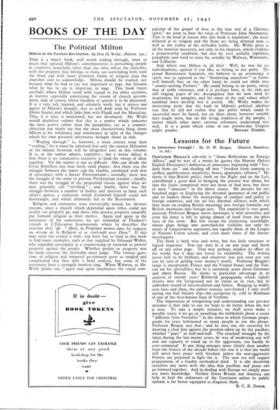Lessons for the Future PROFESSOR BROGAN'S sub-title is " Some
Reflections on Foreign Affairs," and by way of a motto he quotes the Shorter Oxford English Dictionary's definition of innocence, beginning with " free- dom from sin " and shading off into " freedom from cunning or artifice; guilelessness; simplicity; hence, ignorance, silliness." His thesis, is that British policy, both on the Right and on the Left, contributed a great deal to bringing the present war about, but that the faults committed were not those of bad men, but those of men " innocent " in the above senses. He devotes his two hundred pages to displaying the abysmal ignorance of our public and its leaders about the mainsprings of conduct and policy in foreign countries, and the no less abysmal silliness with which they went on reading British meanings into foreign formulas and British intentions into foreign acts. The exposition is very good- natured; Professor Brogan never interrupts it with invective; and even his irony is left to spring almost of itself from the plain facts of the story. But few escape his chastening searchlight, whose glare brings into unwished-for visibility not only the errors of Conservative appeasers, but equally those of the League of Nations Union school, and even more those of the Soviet- worshippers.
The book is both wise and witty, but has little structure or logical' sequence. You can start in it on any page and break off on any other page. That may perhaps weaken its effect on the world, but it does not lessen its readability. The writing never fails to be brilliant, and wherever you cast your eye you can be sure of getting your money's worth. Professor Brogan's range is exceptional; France and the United States and the Vati- can are his specialities; but he is extremely acute about Germany and about Russia. He shows to particular advantage in an analysis of twenty years' Bolshevik propaganda, which rightly throws into the foreground not its virtue or its vice, but its unbroken record of miscalculation and failure. Ranging so widely over facts and ideas, the author remains sure-footed ; I only recall noting one bad literary slip—the ascription (p. 178) to Rimbaud of one of the best-known lines of Verlaine.
The importance of recognising and understanding our pre-war mistakes is that only so can we hope to do better when the war is over. To take a simple instance, we shall never make a durable treaty if we go on mouthing the shibboleth about a treaty " different from Versailles " in the sense in which German propa- ganda for years habituated so many people to use the phrase. Professor Brogan sees that ; and he sees, too, the necessity for drawing a clear line against the position taken up by the pacifists, whether " pure " or half-and-half. The mischief wrought by the latter during the last twenty years, by way of weakening our will and our capacity to stand up to The aggressors, can hardly be over-estimated. If one thing emerges more clearly than another from the history of the decade before this war it is that the world will never have peace with freedom unless the non-aggressive Powers are prepared to fight for it. The new era will require preparations of a frankly methodical kind. It is idle deceiving ourselves any more with the idea that pacifism and peace can go forward together. And in dealing with Europe we simply must use more knowledge. Neither Great Britain nor America can help to heal the sicknesses of the Continent unless its public opinion is far better equipped to diagnose them.
R. C. K. ENSOR.


























 Previous page
Previous page